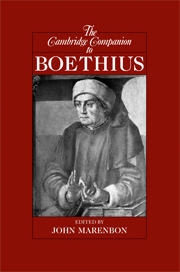Book contents
- Frontmatter
- Introduction: reading Boethius whole
- Part 1 Before the Consolation
- 1 Boethius’ life and the world of late antique philosophy
- 2 The Aristotelian commentator
- 3 The logical textbooks and their influence
- 4 Boethius on utterances, understanding and reality
- 5 The Opuscula sacra: Boethius and theology
- 6 The metaphysics of individuals in the Opuscula sacra
- 7 The medieval fortunes of the Opuscula sacra
- Part II The Consolation
- Appendix: Boethius’ works
- Bibliography
- Index: References to Boethius' works
- General Index
- Series list
5 - The Opuscula sacra: Boethius and theology
from Part 1 - Before the Consolation
Published online by Cambridge University Press: 28 July 2009
- Frontmatter
- Introduction: reading Boethius whole
- Part 1 Before the Consolation
- 1 Boethius’ life and the world of late antique philosophy
- 2 The Aristotelian commentator
- 3 The logical textbooks and their influence
- 4 Boethius on utterances, understanding and reality
- 5 The Opuscula sacra: Boethius and theology
- 6 The metaphysics of individuals in the Opuscula sacra
- 7 The medieval fortunes of the Opuscula sacra
- Part II The Consolation
- Appendix: Boethius’ works
- Bibliography
- Index: References to Boethius' works
- General Index
- Series list
Summary
The Opuscula sacra are a collection of brief but dense and highly influential theological treatises. Their unquestioning commitment to Catholic orthodoxy, not to mention their concern over issues of dogma, has seemed to many to be at odds with the philosophical detachment of Boethius' other works. For a time in the nineteenth century scholars almost unanimously denied their authenticity, but this situation was reversed in 1877 with the publication of a fragment from a hitherto unknown work by Cassiodorus. The fragment states that Boethius “wrote a book concerning the Holy Trinity and certain dogmatic chapters and a book against Nestorius.” This description corresponds nicely to the first, fourth, and fifth of the treatises that have come down to us. Although the others are not mentioned, since they are included in all the manuscripts, and all save the fourth are explicitly attributed to Boethius, there seems little reason to doubt them as well. Our concern here will be the relevance of the treatises for revealed theology, as distinct from their relevance for metaphysics (to be discussed in the next chapter). Accordingly we will set aside the third treatise, the so-called Quomodo substantiae or De hebdomadibus, and focus upon the others.
The only treatise for which we have definite knowledge concerning the circumstances of its composition is the fifth. Boethius tells us in its preface that he was concerned by the hasty reaction in Rome to a letter from some Greek bishops about certain points in Christology. This letter survives and can be dated to autumn 512, so that the fifth treatise was probably written in late 512 or early 513.
- Type
- Chapter
- Information
- The Cambridge Companion to Boethius , pp. 105 - 128Publisher: Cambridge University PressPrint publication year: 2009
- 2
- Cited by



